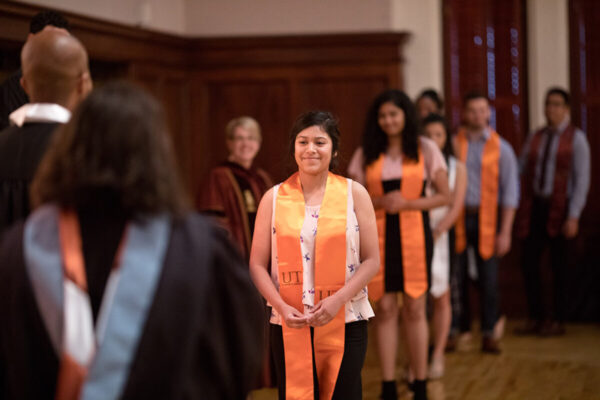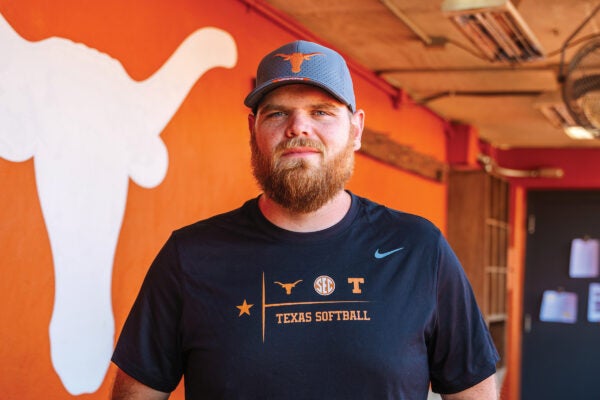A few years after he founded the University Leadership Network, a four-year scholarship and leadership development program at The University of Texas at Austin, David Laude heard a conversation between a handful of students in the program and Sara Martinez Tucker, who was chairman of the Board of Regents at the time.
Laude says he’ll never forget when Tucker asked the students to tell her about the program, and one of the students looked up immediately and said, “I’m a professional.”
“She was so confident in who she was,” Laude says. “In fact, just listening to (the students) talk, you realize they have these enormous capabilities, these enormous skill sets. ULN was letting them be realized.”
Laude, a professor in the Department of Chemistry, created the program while senior vice provost working on an initiative to help boost UT’s four-year graduation rate. At that time, the rate was just above 50%, and then-President William Powers Jr. wanted to increase it to 70%. Laude analyzed statistics and identified a cohort of students who were the least likely to graduate. These students all had economic disadvantages. They were Pell Grant-eligible, first-generation and students of color. Beginning in 2013, the University Leadership Network offered 500 seats to incoming freshmen who fit those demographics.
The University Leadership Network is among several student success initiatives launched in recent years; from 2014 to 2020, the overall four-year graduation rate increased from 55.1% to 72.2%.
Laude says he wanted this program to provide students with financial and academic support but also a sense of belonging at the university and confidence in their capabilities.
“It was the difference between a student sitting there with her head down and tail between her legs because she just got a C on her test,” Laude says, “and a student who sits there confidently and talks about themselves, how they connect to the university and how they’re able to take advantage of its resources to achieve their goals. It’s like night and day, the difference that you see.”
Program members are awarded a scholarship during their four years at UT, but it is given in monthly payments. In return for this financial support, the students are expected to participate in experiential learning opportunities, such as on-campus internships or mentorship programs. Laude specifically wanted to encourage the students to spend more time on campus, which he hoped would foster a feeling of connectedness to the university. The program also helps students develop leadership skills through panels and seminars led by industry professionals and other guest speakers.
Kyle Clark, the program’s current director, was working in Student Services shortly after the University Leadership Network was created. He saw the students working in offices all over campus, including his own. “We were excited to be a part of that,” he says. When there was an opportunity to work with the program, Clark says he did not hesitate.
Clark says he hoped he was already helping students be successful in the work he was doing with Student Services, but he was excited to be involved in “more directed work” with the University Leadership Network.
“I think helping our students — not just by providing the scholarship, but by really helping them be successful while they’re here and setting them up to be successful after they graduate — is the kind of work that gets me up every morning,” Clark says.
Laude, too, is passionate about this kind of work. He says he wanted the program to be a home for its students — somewhere they could turn to for support.
“It was more about taking care of the nonacademic sorts of things that might happen in a student’s life,” Laude says. “If a student wasn’t making it to an internship like they were supposed to, somebody has to follow up and see what’s going on.”
Laude says he struggled to fit in both academically and socially as a college student at University of the South. After his first semester, he says he was “very close to dropping out.”
“It was that set of experiences that informed my sensitivity for what it’s like for students who arrive on campus now,” Laude says. “I suddenly am thinking, ‘These students that aren’t passing my class are the students coming from economic disadvantage, just like I did when I got a C in freshman chemistry.’ And so even though I wasn’t consciously aware of this … I found myself in a position where I was helping versions of myself 40 years later.”
Laude says his long-term goal for the University Leadership Network and university at large is that “economic disadvantage no longer be something that defines whether you’ll be successful in college.”




